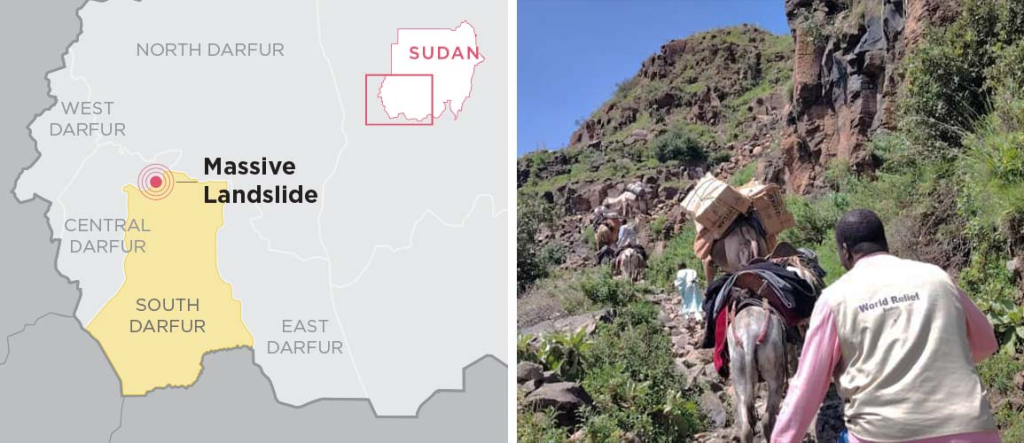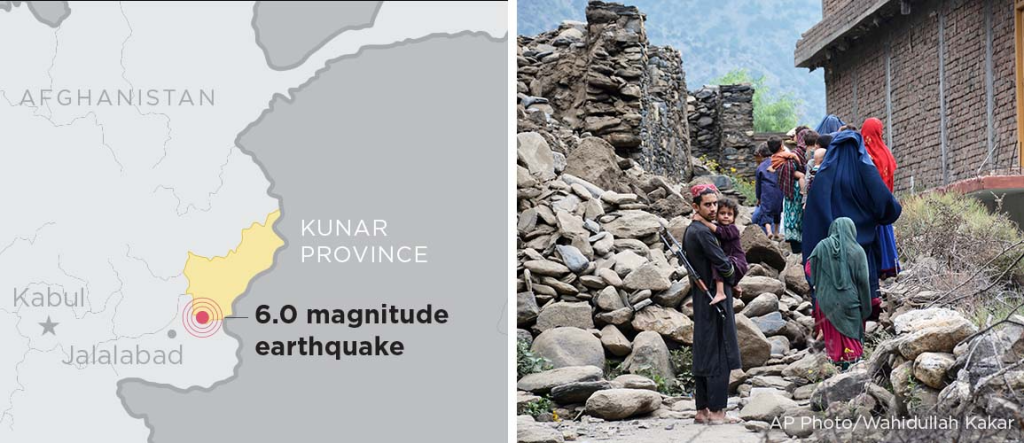The Sudan Landslide & Afghanistan Earthquake: 4 Things You Need to Know
|
Getting your Trinity Audio player ready...
|
On Aug. 31, two of the world’s most fragile countries — Sudan and Afghanistan — were each struck by devastating natural disasters, one after another.
Late into the evening on Sunday, a 6.0 magnitude earthquake hit Afghanistan, causing entire villages in the eastern region of the country to crumble. A few thousand miles away, a village in the South Darfur region of Sudan was engulfed by a powerful landslide.
Assessments of the damages are still underway, but these crises have killed and injured many, and hundreds of families have been displaced. Only to add to the devastation, these disasters come at an already fragile time for both Sudan and Afghanistan, as both countries have encountered armed conflict, political instability, climate disasters and health crises over the past several years.
Thankfully, with local staff on the ground in Sudan and long-standing relationships in both Sudan and Afghanistan, World Relief is uniquely positioned to respond to these urgent needs. With your support, we can ensure that families in both Sudan and Afghanistan find safety and hope in these moments after disaster.
Here’s what you need to know about both crises — and what you can do to respond.
What’s happened in Sudan?
Since July 2025, relentless rainfall has overwhelmed Sudan as part of its annual rainy season, triggering widespread flooding and devastation. On Aug. 31, a massive landslide struck in the Marrah Mountains area, a mountainous region in the South Darfur region of western Sudan, engulfing an entire village. As a result, hundreds of homes were destroyed, leaving families displaced with nowhere to go. And with more rain on the horizon, the danger is far from over.

This disaster is not isolated – it strikes a country already on the brink. Civil war has forced 10.5 million people from their homes. Famine looms in North Darfur. A cholera outbreak has infected more than 99,000 people and claimed over 2,400 lives. Now floods and landslides from Sudan’s rainy season are tearing apart fragile infrastructure, overwhelming health systems, accelerating the spread of disease, deepening hunger and driving even more displacement.
What’s happened in Afghanistan?
Late in the night on Aug 31, a powerful 6.0 earthquake struck eastern Afghanistan, shaking entire provinces. Communities already living on the edge crumbled in the darkness, families were buried beneath rubble and lives were forever changed in an instant. Several strong aftershocks followed in Nangarhar and Kunar, compounding the destruction and loss. In less than a week, more than 2,200 have been confirmed dead and 3,600 confirmed injured. Thousands more have lost their homes.

This crisis further destabilized communities already in distress. Poor infrastructure, recent flooding and years of instability have left families dangerously exposed. Now, many have lost not only their homes, but also loved ones. Mothers search for children, neighbors dig with their hands through debris and survivors wait for aid that struggles to reach them because roads and bridges have been destroyed. Key access routes have been blocked by rocks and landslides, cutting off vehicle access to many earthquake-affected communities. These areas can now only be reached on foot, with travel times of up to three hours from the nearest obstruction point, significantly delaying the delivery of urgent medical care and critical aid.
How is World Relief responding to the disasters?
As a global organization with long-standing partnerships with humanitarian aid workers across the world, World Relief is uniquely positioned to respond to both crises in Sudan and Afghanistan at once.
In Sudan, our on-the-ground presence is allowing us to act swiftly to meet urgent needs. Since 2003, we have been working in Sudan to address some of the country’s most deep-seated challenges, responding to its urgent displacement crisis with critical programs in food assistance, health and nutrition, mental health and psychosocial support, safe water access, sanitation, hygiene promotion and cholera prevention.
Now, in response to the landslide and alongside trusted partners, our team on the ground is providing emergency aid as well as determining how we can best bring relief to other affected communities.
Together, we have worked — and continue to work — quickly to address these immediate priorities:
- Distributing safe water and sanitation supplies to help prevent the spread of cholera and promote hygiene in affected communities
- Providing essential non-food items such as plastic sheets and mats, chlorine tablets and other emergency supplies, ensuring swift support for families who have lost everything
In Afghanistan, we are working with trusted partners on the ground to meet urgent needs for families whose lives have been completely disrupted by the earthquake. Our response with these partners includes providing the following support:
- Food and clean water for families who have lost everything
- Emergency medical care for the thousands injured
- Immediate shelter and protection for those who have lost their homes
- Trauma care and support for those grieving deep loss
How can you help families after the Sudan landslide and Afghanistan earthquake?
When disasters strike, it’s easy to feel overwhelmed by the devastation. But we are not powerless. God invites us to step into the brokenness with compassion and hope.
We are deeply grateful to stand alongside with partners like you to provide tangible
support to communities in Sudan and Afghanistan facing unimaginable loss. In a time of great need, your prayers, generosity and compassion can be the difference, bringing hope where it’s needed most.
Will you join us in meaningful action by financially supporting our response in Sudan and Afghanistan?

Samuel Heard serves as a content specialist at World Relief. His writing has appeared in a variety of outlets, including Baptist Press, Mere Orthodoxy, the Center for Faith and Culture and elsewhere. He lives in Upstate South Carolina with his wife and two children.


